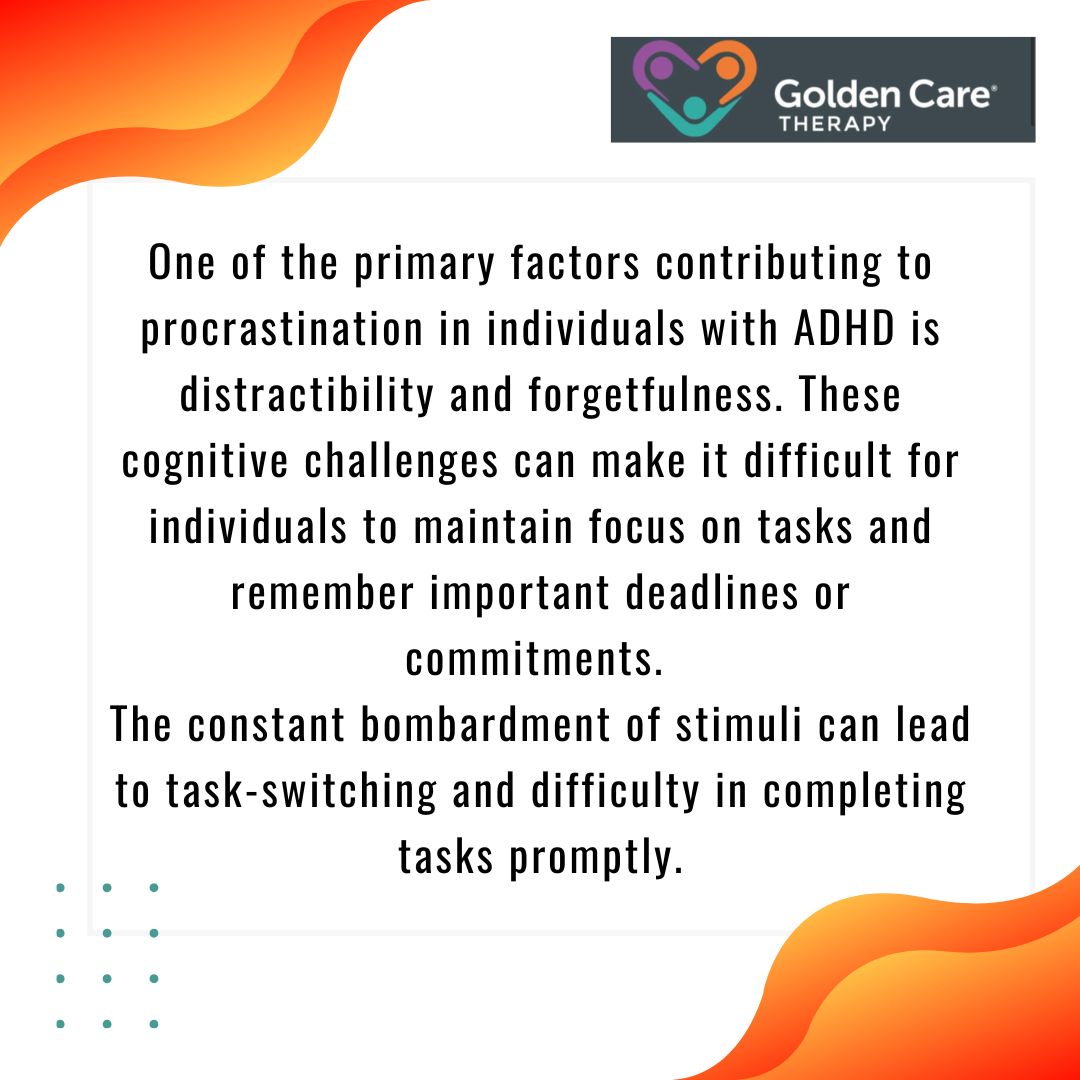
Table of Contents
Procrastination is something many people struggle with, but for those with ADHD, it can feel like a constant battle. Tasks that seem easy for others can become overwhelming and lead to delays, missed deadlines, and frustration. It’s not just about putting things off – there’s often a deeper reason behind it.
Since ADHD affects how the brain processes information, this makes it harder for people to focus, organize, and manage time effectively. Understanding the connection between ADHD and procrastination can help shed light on why this happens and offer ways to manage it better.
Does ADHD Cause Procrastination?
Yes, ADHD can cause procrastination. People with ADHD often struggle with executive function, which includes skills like organization, time management, and task initiation. These difficulties can make it challenging to start or complete tasks, leading to procrastination.
The brain’s reward system in individuals with ADHD may also seek immediate gratification, causing them to delay tasks that don’t offer instant rewards, even if the tasks are important.
Additionally, people with ADHD can become easily distracted or overwhelmed by the steps involved in completing tasks. This sense of being overwhelmed, combined with impulsivity and difficulty focusing, often results in putting off responsibilities. While procrastination is not exclusive to ADHD, it is a common symptom for those dealing with the condition.

Relationship Between ADHD and Procrastination
Although procrastination is not officially recognized as a diagnostic symptom of ADHD, research has shown a significant link between the two.
Contrary to initial expectations of impulsivity playing a key role in procrastination, a 2014 study revealed that procrastination is primarily associated with inattention in individuals with ADHD.
Individuals with ADHD may struggle with initiating tasks, maintaining focus, and managing time effectively, all of which contribute to procrastination tendencies. The challenges in regulating attention and executive functions can interfere with task completion and lead to delays in fulfilling responsibilities.
Evidence suggests that the severity of ADHD symptoms correlates with the degree of procrastination experienced by individuals. Those with more pronounced ADHD symptoms, such as inattention, hyperactivity, and impulsivity, tend to exhibit higher levels of procrastination.
Additionally, internalizing symptoms like depression and anxiety are often intertwined with procrastination in individuals with ADHD.
For some individuals with ADHD, last-minute procrastination can create a sense of urgency that helps them focus and complete tasks efficiently. However, relying on these pressure-induced situations can lead to heightened stress, anxiety, and suboptimal task outcomes.
It is noteworthy that certain individuals with ADHD may resort to prescription stimulants like Adderall to combat procrastination tendencies.
While stimulant medications are commonly prescribed to manage ADHD symptoms, the recreational use of these drugs without medical supervision poses risks, including the potential development of substance dependencies such as an Adderall addiction.
Factors Contributing to Procrastination
As we explore the factors that contribute to procrastination in individuals with ADHD, several key components come into play. These factors play a significant role in understanding the challenges faced by individuals with ADHD and how they relate to procrastination.

Moreover, individuals with ADHD often struggle with organization and time management, which can significantly impact their ability to complete tasks on time. Disorganization can cause tasks to become overwhelming and lead to avoidance behavior, further exacerbating the procrastination cycle.
Difficulties in prioritizing, sequencing tasks, and managing time effectively can all contribute to procrastination tendencies.
Avoidance behavior is a common response to task-related frustrations experienced by individuals with ADHD. Past negative experiences with tasks, coupled with the challenges of ADHD symptoms such as impulsivity and emotional dysregulation, can lead to avoidance of tasks perceived as difficult or unenjoyable.
This avoidance further reinforces procrastination patterns and hinders task completion.
Understanding how these factors contribute to procrastination in individuals with ADHD is crucial for developing tailored strategies to address these challenges. By addressing these underlying factors, individuals with ADHD can better manage their procrastination tendencies and improve their overall functioning in various aspects of life.
How to Manage Procrastination in Individuals with ADHD
Healthcare professionals play a crucial role in managing ADHD and its associated symptoms, including procrastination. Through a combination of therapy, counseling, and medication management, healthcare professionals can help individuals develop effective strategies to cope with procrastination tendencies.
They can also provide guidance on improving time management skills, increasing self-discipline, and understanding the root causes of task avoidance.
Medication and occupational therapy are also commonly used in conjunction to address procrastination in individuals with ADHD. Stimulant medications, such as methylphenidate and amphetamine-based drugs, are often prescribed to help manage the symptoms of ADHD, including procrastination.
These medications can improve focus, attention, and time management, making it easier for individuals to initiate and complete tasks on time.
Occupational therapy is another valuable tool for managing procrastination in ADHD. Occupational therapists work with individuals to develop practical skills for managing daily tasks, organizing workspaces, and creating effective routines.
Then there are stimulant medications which have shown significant benefits in managing procrastination in individuals with ADHD. According to the American Psychological Association, stimulant medications can assist individuals with ADHD in improving time management skills and reducing procrastination tendencies.
That said, individuals with ADHD should work closely with healthcare professionals to determine the most effective treatment plan for managing procrastination. By combining medication, therapy, and lifestyle modifications, individuals can develop the tools and strategies needed to overcome procrastination tendencies and improve their overall quality of life.

Final Thoughts
Long story short, while ADHD doesn’t directly “cause” procrastination, it can certainly make it harder to stay focused and organized, leading to delays in getting things done. Understanding how ADHD impacts time management and using helpful strategies can make a big difference.
With the right tools and support, it’s possible to overcome procrastination and stay on track, even when ADHD is part of the picture! At Golden Care Therapy, we offer high-quality ABA services in Indiana, tailored to meet the unique needs of each individual.
Our team is dedicated to providing compassionate, effective therapy that helps you or your loved one thrive. Contact us today to learn more or schedule a consultation—we’re here to help you every step of the way!
Sources:
- The Connection Between Autism and Mood Disorders - October 22, 2024
- Autistic Shutdown vs Depression: How They Differ - October 22, 2024
- Does ADHD Cause Procrastination? - October 22, 2024
